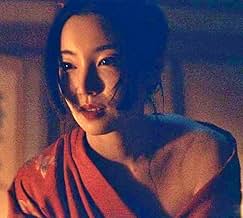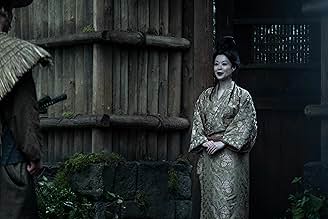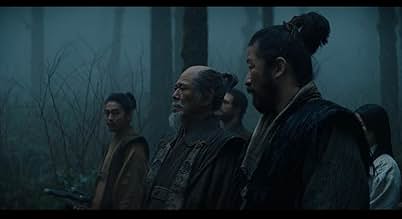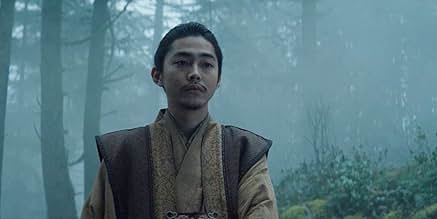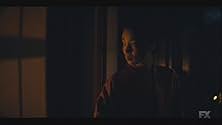A Stick of Time
- Episódio foi ao ar 2 de abr. de 2024
- TV-MA
- 55 min
AVALIAÇÃO DA IMDb
8,3/10
9,1 mil
SUA AVALIAÇÃO
Superado por novas alianças em Osaka, Toranaga é forçado a fazer um novo acordo com um membro da família há muito perdido.Superado por novas alianças em Osaka, Toranaga é forçado a fazer um novo acordo com um membro da família há muito perdido.Superado por novas alianças em Osaka, Toranaga é forçado a fazer um novo acordo com um membro da família há muito perdido.
- Direção
- Roteiristas
- Artistas
Ryo Hayashida
- Tough Green Samurai
- (as Ryohei Hayashida)
Avaliações em destaque
Episode 7 of Shogun, titled "A Stick of Time," continues the tense cultural and political conflicts at the heart of this saga. The episode centers on the growing clash between John Blackthorne (Richard Chamberlain) and the rigid traditions of Japan, as well as the continued maneuvering of Lord Toranaga (Toshiro Mifune) in his quest for power. In this installment, Blackthorne's deepening relationship with Japanese society faces a new test as he grapples with the samurai code of honor, while the ever-shifting political alliances around him further complicate his already precarious position.
The episode begins with Blackthorne's continued struggle to adapt to Japanese customs, particularly as he is forced to navigate the complex system of hierarchy and loyalty. The central conflict of the episode revolves around a test of Blackthorne's allegiance, as Lord Toranaga puts him in situations that challenge his understanding of honor, duty, and survival. Chamberlain delivers a compelling performance, balancing Blackthorne's growing respect for Japanese culture with his own inherent desire for autonomy and freedom. This internal conflict is highlighted in several key scenes, particularly one in which Blackthorne is forced to confront his feelings of superiority as a European, a theme that has been subtly present throughout the series but is more overtly examined in this episode.
One of the strengths of "A Stick of Time" is its portrayal of the political intrigue surrounding Lord Toranaga. Toshiro Mifune's performance continues to be a highlight, as he expertly conveys the cunning and strategic mind of a leader who is always thinking several steps ahead of his enemies. Toranaga's manipulation of both his allies and adversaries reaches new heights in this episode, with the viewer gaining deeper insight into his long-term goals. The scenes between Toranaga and Blackthorne are particularly well-written, filled with tension and subtle power plays, as Toranaga's mentorship of the foreigner serves both personal and political purposes. Mifune's understated but commanding presence keeps the audience engaged, and his ability to convey so much with so little dialogue is a testament to his skill as an actor.
Visually, "A Stick of Time" maintains the series' high standard of production design and cinematography. The episode is beautifully shot, with the natural landscapes of Japan providing a stunning backdrop to the drama. The use of wide shots to capture the vastness of the Japanese countryside, contrasted with the more intimate, close-up shots of the characters' faces, highlights the personal stakes of the story while also emphasizing the broader cultural and political landscape. The costuming, particularly the intricate samurai armor and the colorful kimonos worn by the women, continues to be a visual feast, grounding the series in historical authenticity while also adding a layer of visual storytelling.
However, despite its many strengths, the episode does suffer from some pacing issues. While the political intrigue and character development are compelling, there are moments where the narrative slows down, particularly in scenes that focus too heavily on exposition. While these moments are necessary to fully understand the complexities of the story, they occasionally feel drawn out and disrupt the overall flow of the episode. This is particularly noticeable in the scenes that involve discussions of military strategy and political alliances, which, while important to the plot, could have been more tightly edited to maintain the episode's momentum.
The supporting cast also delivers strong performances, particularly Yoko Shimada as Mariko, whose loyalty to both Blackthorne and Toranaga becomes increasingly complicated as the political stakes rise. Mariko's internal struggle is one of the most compelling elements of the episode, as she is torn between her duty to her lord and her growing affection for Blackthorne. Shimada's portrayal of Mariko's quiet strength and emotional turmoil adds depth to the character, making her one of the most multifaceted figures in the series. Her interactions with Blackthorne in this episode are particularly poignant, as their relationship is tested by the external pressures of their respective loyalties.
In conclusion, "A Stick of Time" is a well-crafted episode that continues to build on the complex political and cultural dynamics that have made Shogun such a compelling series. The performances, particularly by Chamberlain and Mifune, are exceptional, and the episode's exploration of themes like honor, loyalty, and cultural adaptation adds depth to the narrative. While the pacing may falter at times, the episode's strong character development and stunning visuals more than make up for these minor shortcomings. As the series progresses, it becomes clear that Shogun is not just a tale of adventure and survival, but a profound exploration of the clash between cultures and the personal transformations that occur as a result.
The episode begins with Blackthorne's continued struggle to adapt to Japanese customs, particularly as he is forced to navigate the complex system of hierarchy and loyalty. The central conflict of the episode revolves around a test of Blackthorne's allegiance, as Lord Toranaga puts him in situations that challenge his understanding of honor, duty, and survival. Chamberlain delivers a compelling performance, balancing Blackthorne's growing respect for Japanese culture with his own inherent desire for autonomy and freedom. This internal conflict is highlighted in several key scenes, particularly one in which Blackthorne is forced to confront his feelings of superiority as a European, a theme that has been subtly present throughout the series but is more overtly examined in this episode.
One of the strengths of "A Stick of Time" is its portrayal of the political intrigue surrounding Lord Toranaga. Toshiro Mifune's performance continues to be a highlight, as he expertly conveys the cunning and strategic mind of a leader who is always thinking several steps ahead of his enemies. Toranaga's manipulation of both his allies and adversaries reaches new heights in this episode, with the viewer gaining deeper insight into his long-term goals. The scenes between Toranaga and Blackthorne are particularly well-written, filled with tension and subtle power plays, as Toranaga's mentorship of the foreigner serves both personal and political purposes. Mifune's understated but commanding presence keeps the audience engaged, and his ability to convey so much with so little dialogue is a testament to his skill as an actor.
Visually, "A Stick of Time" maintains the series' high standard of production design and cinematography. The episode is beautifully shot, with the natural landscapes of Japan providing a stunning backdrop to the drama. The use of wide shots to capture the vastness of the Japanese countryside, contrasted with the more intimate, close-up shots of the characters' faces, highlights the personal stakes of the story while also emphasizing the broader cultural and political landscape. The costuming, particularly the intricate samurai armor and the colorful kimonos worn by the women, continues to be a visual feast, grounding the series in historical authenticity while also adding a layer of visual storytelling.
However, despite its many strengths, the episode does suffer from some pacing issues. While the political intrigue and character development are compelling, there are moments where the narrative slows down, particularly in scenes that focus too heavily on exposition. While these moments are necessary to fully understand the complexities of the story, they occasionally feel drawn out and disrupt the overall flow of the episode. This is particularly noticeable in the scenes that involve discussions of military strategy and political alliances, which, while important to the plot, could have been more tightly edited to maintain the episode's momentum.
The supporting cast also delivers strong performances, particularly Yoko Shimada as Mariko, whose loyalty to both Blackthorne and Toranaga becomes increasingly complicated as the political stakes rise. Mariko's internal struggle is one of the most compelling elements of the episode, as she is torn between her duty to her lord and her growing affection for Blackthorne. Shimada's portrayal of Mariko's quiet strength and emotional turmoil adds depth to the character, making her one of the most multifaceted figures in the series. Her interactions with Blackthorne in this episode are particularly poignant, as their relationship is tested by the external pressures of their respective loyalties.
In conclusion, "A Stick of Time" is a well-crafted episode that continues to build on the complex political and cultural dynamics that have made Shogun such a compelling series. The performances, particularly by Chamberlain and Mifune, are exceptional, and the episode's exploration of themes like honor, loyalty, and cultural adaptation adds depth to the narrative. While the pacing may falter at times, the episode's strong character development and stunning visuals more than make up for these minor shortcomings. As the series progresses, it becomes clear that Shogun is not just a tale of adventure and survival, but a profound exploration of the clash between cultures and the personal transformations that occur as a result.
As a big fan of the book, I was concerned going into this. James Clavell's vision is so immersive, so precise, I didn't think the creators would pull off a faithful adaptation. Yet somehow, they did. I know Star Wars fans will see the word "somehow" and immediately downvote my review before reading the rest, but I can't help it. Magic can't be explained in the case of Shogun. It is one of the rawest and purest depiction of the time period I've personally seen on screen, and that is owed in no small part to the genius that is Hiroyuki Sanada. His involvement elevates this project to unspeakable heights. I know it sounds like I'm exaggerating, but this show has brought me so much joy. We are but a few episodes away from the finale but I can't forsee even the slightest dip in quality, because it's clear that Rachel Kondo and Justin Marks respect the source material but also have tremendous passion for the story they're telling. I'll admit that I'm bitter - Game of Thrones broke my heart. I've witnessed what happens when you stray from the source material and let your ego guide you. Thankfully, that isn't the case with Shogun. It saddens me that we won't get a season two, just because of how brilliant this gem of a show is. But hats off to both creators for respecting their audience's time. As it is now, Shogun is perfect to me and I have no doubt they'll stick the landing. It's a great year for TV...
Ok, I'm older. I've read the book multiple times, I've seen the 80s miniseries 3 times. This isn't Clavell's Shogun.
This is GoT - lots of promise but crashing and burning.
This is Bram Stoker's Dracula - a much praised movie, that deviated massively from Bram Stoker's novel.
We have 3 episodes left? Maybe I missed it and there's a season 2 coming, but this series is losing me. Seems like the last few episodes, barring a few moments, is the same actors sitting around in the rain in Anjiro mildly plotting, going over the same nonsense over and over. Blackthorne whining about his ship, Buntaro whining about his wife & Blackthorne. Mariko being a grump about literally everything.
They've accomplished almost nothing since the daring escape from Osaka - Blackthorne is still a useless, whiny "barbarian" where in the book by this time, he's much more accomplished with his Japanese, has Samurai warriors, etc. Him and Mariko are firmly in love -
I could go on and on. This had a lot of promise but started falling apart a couple episodes ago.
This is GoT - lots of promise but crashing and burning.
This is Bram Stoker's Dracula - a much praised movie, that deviated massively from Bram Stoker's novel.
We have 3 episodes left? Maybe I missed it and there's a season 2 coming, but this series is losing me. Seems like the last few episodes, barring a few moments, is the same actors sitting around in the rain in Anjiro mildly plotting, going over the same nonsense over and over. Blackthorne whining about his ship, Buntaro whining about his wife & Blackthorne. Mariko being a grump about literally everything.
They've accomplished almost nothing since the daring escape from Osaka - Blackthorne is still a useless, whiny "barbarian" where in the book by this time, he's much more accomplished with his Japanese, has Samurai warriors, etc. Him and Mariko are firmly in love -
I could go on and on. This had a lot of promise but started falling apart a couple episodes ago.
This was a dark, dire episode that does a great job of setting up tension with the nerve jangling music, the grey-and-green pallete, the misty deep forests that seem to be clothed in perpetual night.
We also get more insight into the characters, not just the big three, and hear about their hopes and fears and perspectives on what is happening. Yabushige's nephew seems to be on a collision course with Toranaga now, as Buntaro is on a collision course with Blackthorne.
The details of this episode are very Game of Thrones-y. That's all I'll say, to avoid spoilers.
At the end, Blackthorne seems poised for a different journey that diverges from the one Toranaga and his clan are on. But since they're in the same story, we can be assured their paths will cross again, probably in the next episode.
We also get more insight into the characters, not just the big three, and hear about their hopes and fears and perspectives on what is happening. Yabushige's nephew seems to be on a collision course with Toranaga now, as Buntaro is on a collision course with Blackthorne.
The details of this episode are very Game of Thrones-y. That's all I'll say, to avoid spoilers.
At the end, Blackthorne seems poised for a different journey that diverges from the one Toranaga and his clan are on. But since they're in the same story, we can be assured their paths will cross again, probably in the next episode.
Matt Lambert must've gotten the short straw with the writing assignment for this episode. It's without question the worst out of all seven episodes to this point.
What was the directive here? Maybe something like, "lay waste to every plot and character arc that's been developed so far, and leave the viewers hanging for a sunny-sky resolution..."???
I've watched Sanada perform on screen since he was about 17 years old. In the first movie of his I saw, swinging on trees like a Jackie Chan aficionado, he had more certainty and chutzpah back then than what Lord Toranaga had in this episode.
The Brit sailor was right to tell everyone to go to hell when he walked out on their pointless ceremonial surrender. And what was the point of the Willow World Madam giving us an idea that she had something up her sleeve, some knowledge Toranaga had and which he wasn't sharing with anyone?
And what about the courtesan's desire to "take it to an elevated level" with the betrayer Saiko? She quickly exited. Not clear if she was involved in what happened next, or if she was saving her "elevation" techniques for another time.
I don't see how anything in this episode built on anything before it or leads to any good thing afterward. Basically, this was crummy writing 101. Which is a reflection of crummy thinking.
What was the directive here? Maybe something like, "lay waste to every plot and character arc that's been developed so far, and leave the viewers hanging for a sunny-sky resolution..."???
I've watched Sanada perform on screen since he was about 17 years old. In the first movie of his I saw, swinging on trees like a Jackie Chan aficionado, he had more certainty and chutzpah back then than what Lord Toranaga had in this episode.
The Brit sailor was right to tell everyone to go to hell when he walked out on their pointless ceremonial surrender. And what was the point of the Willow World Madam giving us an idea that she had something up her sleeve, some knowledge Toranaga had and which he wasn't sharing with anyone?
And what about the courtesan's desire to "take it to an elevated level" with the betrayer Saiko? She quickly exited. Not clear if she was involved in what happened next, or if she was saving her "elevation" techniques for another time.
I don't see how anything in this episode built on anything before it or leads to any good thing afterward. Basically, this was crummy writing 101. Which is a reflection of crummy thinking.
Você sabia?
- CuriosidadesA ri is a Japanese unit of measurement that is about 3.93 kilometers, or 2.44 miles. It is defined as the distance a person can walk in an hour at a reasonable pace.
- Citações
Yoshii Toranaga: Why is it that only those who have never fought in a battle are so eager to be in one?
- Trilhas sonorasThe Pull of Death
performed by Atticus Ross, Leopold Ross & Nick Chuba
Principais escolhas
Faça login para avaliar e ver a lista de recomendações personalizadas
Detalhes
- Tempo de duração55 minutos
- Cor
- Mixagem de som
- Proporção
- 2.00 : 1
Contribua para esta página
Sugerir uma alteração ou adicionar conteúdo ausente

Principal brecha
What is the Canadian French language plot outline for A Stick of Time (2024)?
Responda

